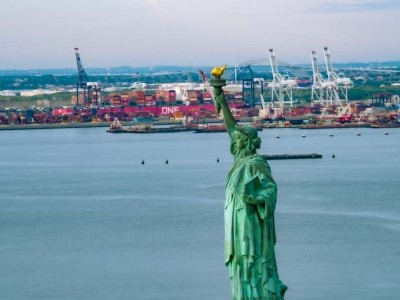AAPA harbor maintenance funding agreement advances in House
Jul 16, 2020On Wednesday, July 15th, the House Transportation and Infrastructure Committee approved H.R. 7575, the Water Resources Development Act of 2020, legislation to authorize navigation, flood control and environmental water projects throughout the United States. Of key interest to all ports, the legislation includes a modified version of the harbor maintenance funding distribution plan negotiated by the American Association of Port Authorities (AAPA).
As a reminder, the Harbor Maintenance Trust Fund (HMTF) was created by Congress in 1986. It receives revenue from the Harbor Maintenance Tax (HMT), a fee collected from companies that ship goods through the nation’s ports. The purpose of the tax is to fund the Army Corps of Engineers’ operation and maintenance activities. In the Great Lakes, these activities include regular dredging of harbors, maintenance of breakwaters, and operation of the Soo Locks. Despite the fact that adequate revenue is being collected (approximately $1.7 billion annually), Congress has historically restricted spending on harbor maintenance due to budgetary constraints. The result is crumbling infrastructure and harbors choked with sand and silt. In the Great Lakes region there is a $150 million dredging backlog. Breakwaters and jetties need $300 million in repairs, and the Soo Locks require $73 million in upgrades.

Under AAPA’s 2018 harbor maintenance agreement, the nation’s ports agreed that annual expenditures from the Harbor Maintenance Trust Fund (HMTF) should be provided special budgetary treatment by Congress and not constrained by the federal budget process. Legislation to accomplish this goal was enacted by Congress on March 27, 2020.
The agreement also called for an equitable distribution of HMTF annual expenditures. Under the plan, the Great Lakes region and 5 other port regions were to receive no less than 10% of annual expenditures from the HMTF each. Emerging harbors (those with < 1 million tons/year) were to receive no less than 10% of annual expenditures, and donor and energy transfer ports were to receive a share of funds (between 10-20 percent) depending on overall spending levels.
H.R. 7575 tweaks the plan as follows:
First, it expands the special budgetary treatment of HMTF expenditures enacted by Congress last March. The law currently allows annual expenditures from the HMTF to be exempt from Congressional budget caps. This is meant to encourage the House and Senate Appropriations Committees to fully fund the program each year and not constrain it for budgetary reasons. However, the provision is limited. Annual expenditures up to - but not exceeding - the previous year’s Harbor Maintenance Tax revenue are exempt from budget caps. H.R. 7575 abolishes the limitation. In doing so, it allows Appropriators to dip into and expend the $9.3 billion surplus balance of the HMTF. If they do so, all those funds would be exempt from the budget caps. This is a huge win for the maritime industry and could result in a windfall of funding to address the backlog of Corps of Engineers maintenance work at the nation’s ports.
Second, H.R. 7575 modifies the original funding distribution scheme. Instead of requiring that 10% of annual expenditures go to the Great Lakes region, it requires that 12% of annual expenditures go for projects in the Great Lakes. Similarly, instead of 10% for emerging harbors, the bill includes 20%. Instead of 10-20% for donor and energy transfer ports, the bill includes 10% for donor ports. Set asides for other port regions have been dropped. Set asides for energy transfer ports have been dropped.
An important footnote to the above, the percentages stipulated only apply to spending up to but not exceeding previous year revenue into the HMTF. Should Congress begin spending the trust fund surplus, the percentage set asides won’t apply to those funds.
In short, the House legislation should unleash previous constrained harbor maintenance spending and guarantee that a healthy share of those funds are spent in the Great Lakes
H.R. 7575 will now go to the House floor for debate and final passage.
The Senate version of the water resource legislation was approved by the Environment and Public Works Committee on May 6th. The “America’s Water Infrastructure Act of 2020” (S. 3591) does not include the harbor maintenance spending agreement; however, a number of Senators are working to amend the bill when it comes to the Senate floor to add the agreement.
Similar Stories

Strike updates on Canada’s West Coast and Port of Montreal
View ArticlePorts awarded more than half a billion in MARAD PIDP Grants
The $580 million in grants awarded today range in size from more than $53 million for the Port of San Juan Puerto Rico to restore key wharves to $708,750 for…
View Article
Port of Hamburg: Sustained growth in hinterland transports
View Article
Port of Hueneme and Port of Paita sign MoU to establish a sister port relationship
View Article
New electric yard truck helps Port of Tacoma demonstrate zero-emission technology
View Article
Port Authority of NYNJ proposes $9.4 billion budget for 2025
View ArticleGet the most up-to-date trending news!
SubscribeIndustry updates and weekly newsletter direct to your inbox!





